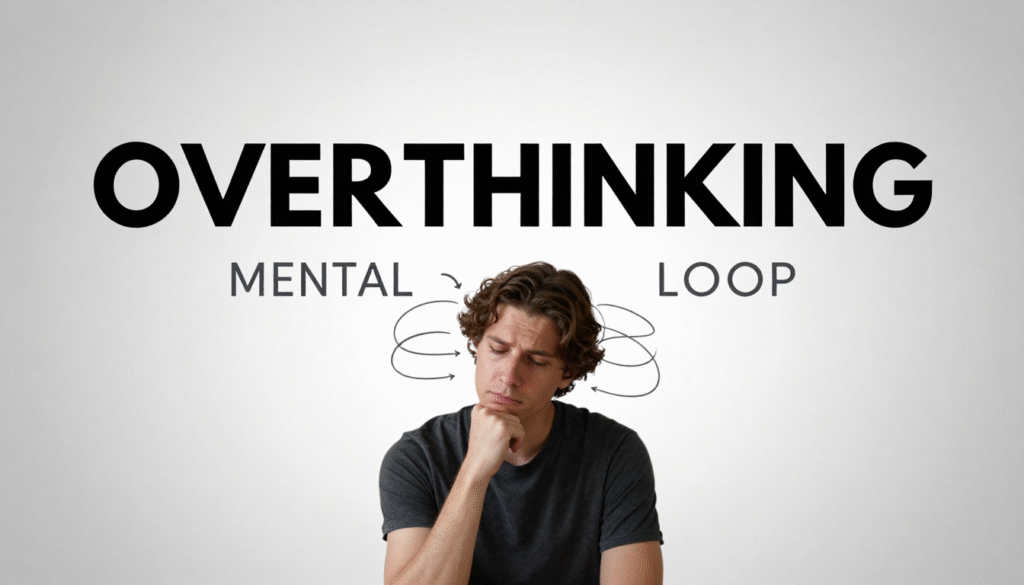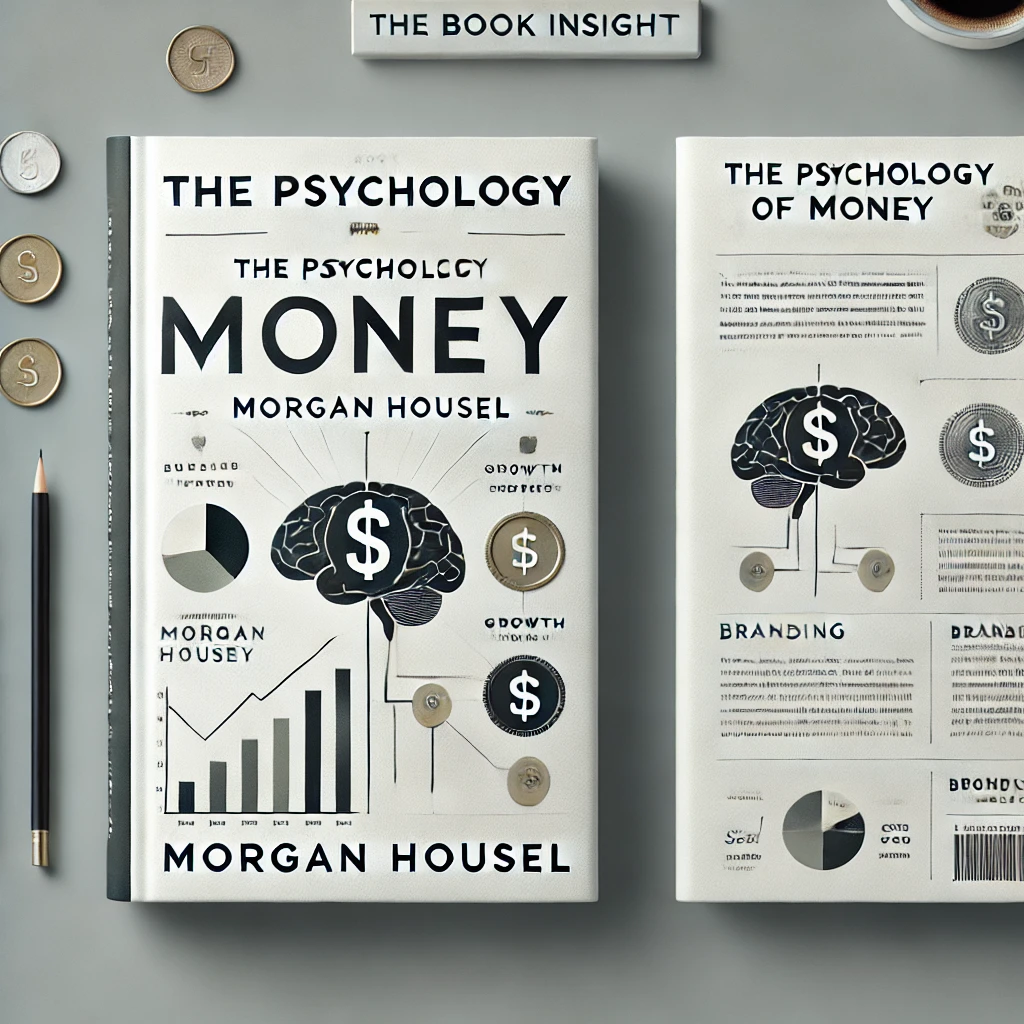Table of Contents
ToggleThe Psychology of Overthinking: Understanding the Mental Loop and How to Break Free
“Have you ever replayed a conversation in your mind a hundred times?”
Yes, we all have thousands of conversations in our mind, replaying repeatedly without taking a break. We start a chain of thoughts, interlinked again and again, till infinity — creating an enemy within our minds called the overthinking paradox.
A cycle of thoughts runs consistently, impacting our mindset, health, peace, decision-making, and trapping us in an endless loop of overthinking. The sad part is, when we are stuck in this loop, we often don’t even realize we’re trapped inside our own minds.
We start questioning ourselves, answering our own questions, and from each answer, a new question arises — birthing another answer, then another question, and so on.
According to researchers, the average person has over 6,000 thoughts per day — and many of these are repetitive or negative. Around 80% of our daily thoughts are negative, which could explain why so many people develop a negative mindset over time.
As per my knowledge and experience, I believe the foundation of mindset is built in childhood. Children learn from observing their families and parents. If parents maintain a clear and positive approach, children’s minds naturally absorb this positivity early on. Schools also play a critical role — schools and the education system should introduce weekly or monthly programs focused on positive thinking and emotional well-being. A small overview of positive thoughts can make a big difference.
What Is Overthinking?
“Overthinking is when you dwell or worry about the same thought repeatedly.”
Overthinking has become one of today’s biggest mind-disturbing habits. It’s a consistent thought generation cycle that leads nowhere — exhausting mental energy without any productive outcome.
Difference Between Deep Thinking and Obsessive Overthinking:
- Deep thinking: Involves focused reflection that leads to insights or decisions.
- Overthinking: Involves dwelling without action, stuck in fear and doubt.
Brief Types of Overthinking:
- Ruminating (Past-focused): Replaying past mistakes or conversations.
- Worrying (Future-focused): Creating fears about future outcomes.
The Psychology Behind Overthinking
Our brains have a Default Mode Network (DMN) — the part that becomes active when our mind is at rest and not focused on the outside world. Unfortunately, DMN tends to wander toward negative thinking patterns when unchecked.
We also inherit a negativity bias from our ancestors — our brain evolved to notice threats and dangers first for survival. Today, instead of predators, we see threats in career pressures, relationships, and social acceptance.
Role of Brain Chemicals:
- Dopamine: The brain craves rewards. Overthinking about “what if” scenarios triggers tiny dopamine releases, making us feel falsely productive.
- Cortisol: The stress hormone spikes when uncertainty or fear arises, locking us in a mental loop.
What is Analysis Paralysis?
Analysis Paralysis is the inability to make decisions due to overthinking.
When too many options or outcomes cloud our mind, confusion leads to delay or inaction.
Brain imaging studies show that overthinking increases activity in the prefrontal cortex, the area associated with planning and decision-making. But too much activity here can decrease performance — for example, a study found that participants performed worse on creative tasks when their prefrontal cortex was overloaded.
Why Do We Overthink?
Fear of Failure or Making the Wrong Decision
A little fear is good — it pushes us to prepare better. But excessive fear traps us like a black hole.
In school exams, I personally experienced the anxiety of failure, which brought endless negative thoughts. Society glorifies winners but often ignores those who stumble, building a deep fear of failure in us.
In families, many children experience rejection when choosing a partner, career, or life path different from expectations. These pressures heavily influence the mind and trigger overthinking loops.
Low Self-Esteem or Lack of Confidence
When confidence is low, even small tasks can cause overthinking.
Thoughts like “What if I blank out while speaking?” or “What if someone laughs at me?” rise up.
The subconscious mind accepts whatever we repeatedly feed it — so if we keep feeding fear and doubt, it starts treating them as reality. Training it with positive beliefs is essential.
Past Trauma or Regrets
Many times, we hear about couples who breakup after years of relationship, then live with regret.
People who suffer accidents or major setbacks question their past decisions endlessly.
By doing this, they not only ruin their past memories but also destroy their present happiness.
Lack of Clarity and Control
Confusion about life choices — like students unsure of career paths — fuels overthinking.
Without clarity, the mind keeps swinging between possibilities, fearing that a wrong step could ruin everything.
Signs You’re Overthinking (Checklist Style)
- 🔁 Replaying conversations in your head
- 😴 Difficulty sleeping due to racing thoughts
- 🔍 Overanalyzing small decisions
- 🧩 Always seeking “perfect” answers
- 🥱 Feeling mentally drained
Impact of Overthinking on Mental Health
Anxiety, Stress, and Depression
Overthinking keeps our body in a fight-or-flight mode, exhausting the nervous system, leading to anxiety disorders or depression over time.
Procrastination and Decision Fatigue
Procrastination is a side effect of overthinking. Books like Eat That Frog teach us that starting with the toughest task removes mental clutter.
Pomodoro Technique (25-min work, 5-min break) is another simple method to reduce procrastination and stay productive.
Isolation and Relationship Issues
Overthinkers tend to withdraw — fearing judgment, they often disconnect from friends, family, and social groups.
Loss of Productivity and Joy
When thoughts spiral endlessly, we lose focus on the present.
We forget to smile, to live freely, and slowly lose the very moments that bring joy — aging ourselves prematurely with mental exhaustion.
How to Break the Overthinking Loop (Solutions Section)?
✅ Practice Mindfulness & Meditation
Daily meditation (even 10-30 minutes) refreshes the mind and reduces intrusive thoughts.
✅ Use the 5-5-5 Rule
Ask yourself: Will this matter in 5 minutes? 5 days? 5 years?
If not, let it go.
✅ Journal Your Thoughts
Whenever I read a book or have a deep conversation, I jot down key learnings in my own words.
Writing clarifies the mind and gives thoughts a tangible outlet.
✅ Set a Time Limit on Thinking
Assign 10-15 minutes to think deeply about a problem.
Ask guiding questions like: Why am I thinking about this? What positive action can I take?
✅ Shift to Action: Take Small Steps
Books like The Compound Effect and Atomic Habits emphasize daily 1% improvements.
Whether it’s 1 extra pushup or reading 1 more page, consistency compounds over time.
✅ Focus on What You Can Control
Don’t waste energy on things outside your control.
Focus on small, manageable actions within your reach.
✅ Get External Feedback: Talk to Someone
Sometimes just talking to a trusted friend or mentor breaks the loop of mental echo chambers.
Bonus: Books That Help You Think Less & Live More
- The Subtle Art of Not Giving a F*ck – Master the art of selective caring.
- Think Like a Monk – Train your mind for clarity, purpose, and calmness.
- Atomic Habits – Building positive daily habits leaves no room for overthinking and negativity.
- The Power of Now – Eckhart Tolle’s classic on living in the present moment, freeing yourself from endless mind chatter.
Conclusion
Overthinking isn’t something we can “cure” overnight. It’s a lifelong journey of awareness, mindfulness, and action.
Recognizing the signs early and practicing small strategies consistently can break the loop and bring back the joy of living fully.
Start today — even adopting one tiny change can make a noticeable difference in how you feel tomorrow.
👉 Which of these signs of overthinking do you see in yourself? Drop a comment below — let’s discuss.
OR
👉 Want more insights like this? Subscribe to our newsletter for weekly mind resets.



